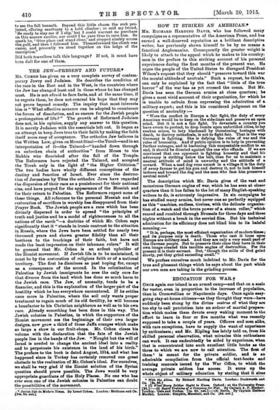THE JEW—PRESENT AND FUTURE. * Mn. COHEN has given us a
very complete survey of contem- porary Jewry and Judaism. He describes the condition of the race in the East and in the West, in the countries where the Jew has changed least and in those where he has changed moat. He is not afraid to face faote,and at the same time, if lie regrets them, he does not conceal his hope that they may not prove beyond remedy. The inquiry that most interests him is " What effective measure can be adopted to counteract the forces of dissolution, and so ensure for the Jewish people a prolongation of life ? " The growth of Reformed Judaism does not, in his opinion, supply any answer to this question. It is merely Judaism with the essentials left out. It began as an attempt to keep Jews true to their faith by making the faith itself more easy of acceptance. The orthodox Jew believes in the Written Law, given on Mount Sinai—the Torah—and in an interpretation of it—the Talmud—" handed down through en unbroken chain of authorities" from Moses to the Rabbis who flourished after the fall of the Temple. The Reformers have rejected the Talmud, and accepted the Torah only in the light of "the Higher Criticism." The two bodies have wholly different conceptions of the destiny and function of Israel. Ever since the destruc- tion of Jerusalem by Titus the orthodox Jews have regarded the dispersion of their race as a punishment for their national sine, and have prayed for the appearanee of the Messiah and for their return to Palestine. The Reformers expect none of these things. All reference to the personal Messiah and the restoration of sacrifices in worship has disappeared from their Prayer Book. The Jewish people are a race which has been divinely dispersed in order to spread "the principles of truth and justice and be a model of righteousness to all the nations of the earth "—a doctrine of which Mr. Cohen says significantly that it " stands in ironic contrast to the situation in Russia, where the Jews have been settled for nearly two thousand years and shown greater fidelity than all their brethren to the teachings of their faith, but have not made the least impression on their inhuman rulers." It will be guessed that Mr. Cohen 5.11 an ardent upholder of the Zionist movement. If Jewish life is to be maintained, it must be by the restoration of religious faith or of a national territory. The first be dismisses as past hoping for, except as a consequence of the second. In the colonization of Palestine by Jewish immigrants he sees the only cure for that divorce from the land which has done so much harm to the Jewish race. The Jew, of necessity, tends to be a financier, and this is the explanation of the larger part of the hostility which he has everywhere encountered. If be settles once more in Palestine, where the moil only wants proper treatment to regain much of its old fertility, he will become a benefactor to his Christian neighbours as well as to his own race. Already something has been done in this way. The Jewish colonies in Palestine, in which the supporters of the Zionist movement see the beginnings of their own larger designs, now grow a third of those Jaffa oranges which make so large a show in our fruit-shops. Mr. Cohen closes his volume with the declaration that the fate of the Jewish people lies in the bands of the Jaw. " Nought but the will of Israel is needed to change the ancient ideal into a reality and to perpetuate his existence in the land of his birth." The preface to the book is dated August, 1914, and what has happened since in Turkey has certainly removed one great obstacle to the realization of Mr. Cohen's ideal. For ourselves we shall be very glad if the Zionist solution of the Syrian question should prove possible. The Jews would be very appropriate guardians of the Holy Places. No one who has ever seen one of the Jewish colonies in Palestine can doubt the possibilities of the movement.
• • .forisli inlIodern Mow. By Israel Cohen. London: Methuen and Co. [Lea. ed. at.)






































 Previous page
Previous page